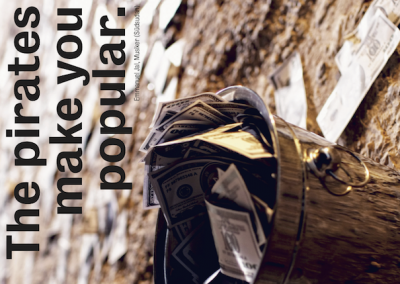Power and Positions
Money rules the world. Like everyone else, musicians need to pay rent and taxes. They are also affected by the daily business of producing music: How much does a new computer cost? How can I pay for advertising my new track on social media? How can I use streaming services? We asked musicians from the Norient network how to get heard in global music. A virtual debate from the Norient exhibition Seismographic Sounds (see and order corresponding book here).
Quotes
«The Internet and pirated software have totally changed the power dynamic in global music in the Arab World and elsewhere. It’s not only the rich kids who speak anymore. The best example is the rise of the Egyptian dance music from the streets, called mahraganat, in the years 2006 and 2007. It has become the omnipresent soundscape of Cairo, flying out of every microbus, every taxi and every tuc-tuc. Music in Egypt now is not just about rich kids, nor is music from Egypt about rich kids. It’s about kids from the poor neighborhoods who started making music together. Today, one decade later, mahraganat musicians have just signed distribution deals with Sony International and play gigs all around Europe.»
Maha El Nabawi, writer and co-founder of the independent newspaper Mada Masr (Egypt)
«It is obvious that in non-western countries, many if not most musicians and composers who do play electronic music come from rich families. They have better access to education, universities, academies, and to the Internet. They have more free time, hence they can afford to play music, to compose music, and to buy gear. In families that are not so rich or not rich at all, people don’t have time to think about global music, experimental music, electronic music. They think about what they shall do tomorrow in order to eat.»
C-drík Fermont, vegan artist, DJ, singer, composer and drummer (Germany)
«With our label Activia Benz we are kind of modern day Robin Hoods. But instead of stealing from the rich, we are working with them; instead of giving money to the poor, we give them mp3s. Getting money from brands, big companies, or major labels is kind of a modern way to earn money. I think it’s a really interesting time at the moment because people actually need to think of more interesting ways to see some money, they need to be creative.»
Gregory aka Slugabed and Jake, producers and co-owner of the label Activia Benz (Great Britain)
«In this country, you gotta make the money first. Then when you get the money, you get the power. Then when you get the power, then you get the women.»
Tony Montana in Scarface (Brian de Palma, USA 1983)
«It’s not so much wealth that decides who is actually listening to your music, but it’s more the geographic position from which people speak and act. Global media is mostly dominated by English language and thus producers and DJs from the Anglo-Saxon world have a dominant voice in global music. It is easier for them to promote their music through English speaking media outlets.»
Daniel Haaksman, music producer and director of Man Recordings (Germany)
«Making money is a wonderful thing, but for me the primary function of Pidgen Music was to create the environment that would create the product that could generate the money. Pidgen Music for me has always been bigger than a business.»
Panji Anoff, founder of the label Pidgen Music and music producer of popular Ghanaian sounds in Pidgen English (Ghana)
«One show can pay for your album.»
Emmanuel Jal, rapper and a former child soldier, who became famous with messages of peace and reconciliation and assumes he will shock people by including different experiences in his next album (South Sudan)

«It feels strange to know that you come from one of the richest places on earth. One of the things I criticize is the distribution of wealth. But I’m doing this by traveling into other countries and I can only do this because of the support of—for example—the Swiss arts council. I go to these poor so-called third world countries and play there for free. Of course it’s nice that I can share something that way, but I never get rid of the feeling that there’s something patronizing about it.»
Dave Phillips, sonic activist, composer, performer and researcher (Switzerland)
«Ten years ago, the music scene in China was exploding and people were experimenting a lot. Nowadays I see that some of the people I knew, who did sound art and so on, have stopped. What are they doing now? Minimal techno and stuff like that. Why? Just because it brings money. In many places there is no sponsorship from non-private curators. It is really frustrating to see people going into another direction just because they need to survive, but I understand them somehow. Meanwhile, the Chinese state starts to care a bit about music because they have to show a positive image to the world.»
C-drík Fermont, vegan artist, DJ, singer, composer and drummer (Germany)
Video Debate Statements by
Simon A. Akindes, Associate Professor in the Department of Politics, Philosophy and Law at the University of Wisconsin-Parkside (USA) Effy B, Radio Producer (France)
Thomas Burkhalter, Ethnomusicologist and Founder of Norient.com
Rudolf Dethu, Music Journalist and Manager (Indonesia)
Maha ElNabawi, Writer and Co-Founder of the Independent Online Newspaper Mada Masr (Egypt)
C-drík Fermont, Vegan Artist, DJ, Singer (Germany)
Rona Geffen, DIY Musician & Artist (Germany)
Daniel Haaksman, Founder of the Label Man Recordings (Germany)
Arshia Fatima Haq, Filmmaker, Writer and DJ, and Founder of Discostan (USA)
Renato Martins, Blogger and Founder of Funknacaixa.com (Brasil)
Kim Emil Ramstedt, Radio & Club DJ, Producer, Promoter, PhD Candidate in Musicology (Finland)
Bit-Tuner, Musician (Switzerland) Video Cut: Stephan Hermann, Coupdoeil
Some quotes from this debate were published in the second Norient book Seismographic Sounds.
Shop

Published on February 28, 2018
Last updated on August 11, 2020